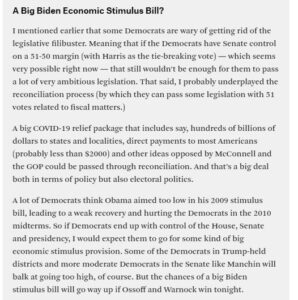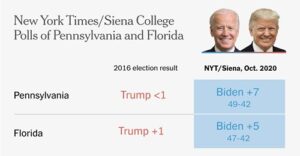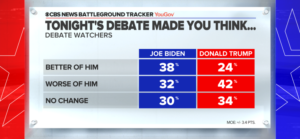In “The Democratic Party Has a Fatal Misunderstanding of the QAnon Phenomenon: Their belief that this surreal conspiracy has arisen because of the poor education of its adherents is based in classism, not reality,” Osita Nwanevu writes at The New Republic: “There were plenty of graduates and good students in the mob that day. Plenty of dropouts and poor students looked on in horror. And as much as the right’s critics might prefer an understanding of what’s happened to our politics that flatters their intelligence, the challenge we’re facing isn’t that millions of hapless and benighted yokels have been bamboozled by disinformation. It’s that millions of otherwise ordinary people from many walks of life—including many who went to and even excelled in college—have a material or ideological interest in keeping the Democratic Party and its voters from power by any means possible. And those means include the utilization of narratives, including conspiracy theories, that delegitimize Democrats and offer hope of their eventual comeuppance….Democrats should try campaigning on the truth: The Republican Party is controlled by intelligent, college-educated, and affluent elites who concoct dangerous nonsense to paper over a bigoted, plutocratic agenda and to justify attacks on the democratic process. That agenda and those attacks are supported by millions of reasonably intelligent voters who will believe or claim to believe anything that furthers the objective of keeping conservatives in control of this country forever. Simply pointing to figures like Greene and hoping the indignation of college graduates will do the rest is a mistake. Instead, Democrats should present voters with a material choice between a party that has nothing to offer the majority of Americans but abuse and conspiratorial flimflam and a party committed to building a democracy and an economy that work for all. If they don’t, the lizard people who run the GOP will be running the government again in no time.”
Skylar Baker-Jordan’s article, “I come from white Appalachia. Here’s the hard truth about Marjorie Taylor Greene and why you can’t stop her: Nobody in DC can realistically rid us of Greene. If you want to strategize, take a look at what people think on the ground” at The Independent provides sensible guidance about how to get rid of the latest looney Repubican. As Baker-Jordan writes, “You will never find enough Congressional Republicans to reach the two-thirds threshold needed to send her packing. The only way to get rid of Marjorie Taylor Greene is the same way she got into the Capitol in the first place: via the ballot box. To do that, we need to be fighting Taylor Greene not in DC, but in Dalton….Georgia’s 14th Congressional District, which Taylor Greene represents, borders my own district here in Tennessee and isn’t much different….Trump’s anointed candidate, Taylor Greene faced a comparatively poorly funded primary challenge which state GOP operatives blame McCarthy for stymying. Her Democratic opponent in the general was forced to drop out following a divorce which necessitated his move out of state, meaning she ran unopposed in the general election. Her victory is as much an accident of circumstance as it is a five-alarm fire of insanity….Democrats have long ignored the region and Republicans have long taken it for granted. So, the people of the Georgia 14th — faced with no real alternative — elected the South’s answer to the Mad Queen Cersei Lannister….Finding a local candidate with roots in the region to challenge her, either in the primary or in the general, could lead to her downfall. The Georgia Republican Party is in full-on civil war following its historic losses in the presidential and Senate races, but the Democratic Party — backed by an excellent ground game built and orchestrated by Stacey Abrams — is in a better position than it has been in decades….Focusing our efforts on expelling Marjorie Taylor Greene isn’t only going to backfire. She raised $1.6 million off the efforts just last week, and the people of her district aren’t taking kindly to being told their choice isn’t good enough. If we want to extinguish this fire before it consumes us, we need to turn on the hose right now. But we need to fight this fire at its source, which means dousing the flames down in Georgia — not in DC.”
Marianne Levine reports on the “Democrats’ big shift in Trump’s second impeachment” at Politico: “Democrats made a push for witnesses central to President Donald Trump’s first impeachment trial. But not this time….Senate Democrats are making it clear they’re taking a different approach than they did for Trump’s infamous Ukraine call. Now, they say their experience as witnesses to the Jan. 6 insurrection is enough….“This is based on a public crime,” said Sen. Richard Blumenthal (D-Conn.). “His intent was unhidden and so I think there’s a danger as there always is for a trial lawyer and prosecutor to over-try, to add more witnesses that prove the obvious.”….Some Senate Democrats have called for a prompt trial, citing other priorities like coronavirus relief and the extreme unlikelihood that 17 Republicans will join them in convicting Trump. Meanwhile, most Republicans are coalescing around the argument that impeaching a former president is unconstitutional.” While Democrats feel an obligation to do their duty and try to convict Trump, they don’t want to waste too much time on it — especially when all indications are that the GOP is not going to do theirs. The evidence and the case for conviction are overwhelming to honest people who have a conscience and care about democracy. Unfortunately, few of today’s Republican senators meet that standard.
E. J. Dionne, Jr. makes the case for conviction of Trump in his current Washington Post column, and his summation explains why Democrats had to do their duty: “He lied about the election — consistently, resolutely, systematically. He kept race in the forefront, regularly leveling his fraud charges against big Democratic cities in swing states where Black voters were a decisive force….And then he moved to replace democracy with mobocracy, gathering a throng in Washington and inciting it to march to the Capitol and sack it. Five people died, including a Capitol Police officer, and the crowd threatened other elected officials, including Trump’s own vice president. This is the outrage that the House impeachment managers will describe in detail this week. The nation, and especially the Republican Party, cannot just walk away….The managers are expected to show video interviews of members of the rampaging horde making clear that they were doing what they were doing because Trump asked them to. And they will demonstrate that Trump himself welcomed the violence….We cannot have the national “unity” everyone claims to yearn for unless the president’s own party acknowledges that these were high crimes and misdemeanors of a fundamental sort. We’re talking about an attack on democracy itself through force and violence at the beckoning of a leader who sought to corrupt not only our political process but also our self-understanding as a nation of equals….The impeachment managers will be insisting that this can never be our “new normal.” Here’s wishing them Godspeed in their work.”






